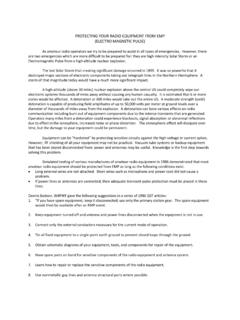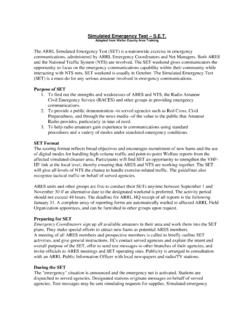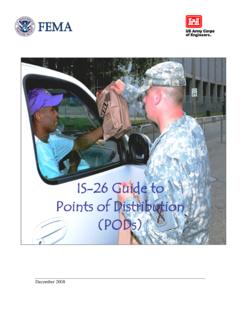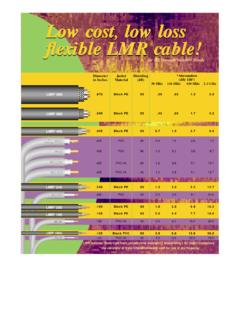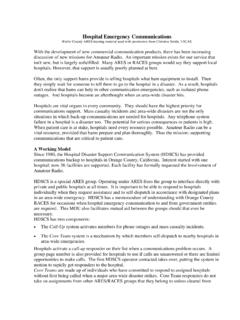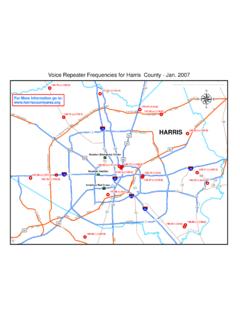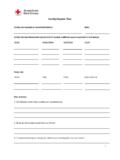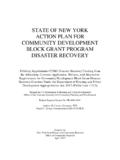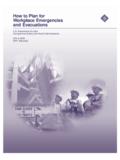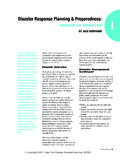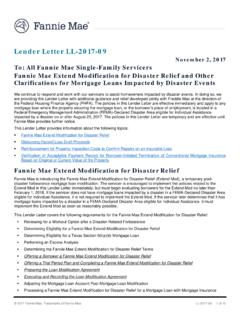Transcription of Ecom Family Plan - Harris County ARES
1 An Emergency/ disaster Communications plan for your own Family Modified and adapted by Earl Pack AE5PA. Base material from a Cook County ARES training article 3/24/2004. As amateur operators we spend time practicing and preparing for emergency communications in case of a disaster . Many of us travel out of town or are separated from our families by some distances for work on a daily basis. Since the safety and wellbeing of our families should be our first responsibility, do we have a plan for communicating with them. Consider what you would do if a disaster struck your community and you were separated from your Family . How would you reach them to let them know you are OK? Or you are out of town and disaster strike the community where your Family is located. How would you reach them to determine if they are OK? How will they reach you? Perhaps your plan is to just call each other using your cellular, phone?
2 But cellular and other wireless telephone networks are generally not as robust as the wire line telephone network. The wire line telephone network employ central office equipment designed for reliability, with certain critical equipment deployed redundantly, multiple levels of backup power supplies, and most infrastructure equipment is located in sturdy, secure buildings. The infrastructure of wireless networks mostly lacks these features. For example, many cell sites have no backup power. In addition, most wireless networks operate at or near capacity under normal conditions. When a disaster occurs, demand for service may be many, many times greater than the normal demand, which means that even if the wireless system is not damaged in the disaster , many calls will not complete. My personal experience working in Gulfport, MI after Hurricane Katrina proved that cell phone service was very limited.
3 So what if the wireless phone networks have been damaged, or they are so congested that you can't get calls through, or you had to evacuate a building on short notice and simply couldn't return to your desk to get your phone? You might try using a pay phone or other land-line phone to call your home, but the same disaster that has affected you might affect your home, such that your Family members are stuck at school, work, or in a shelter. You could try leaving a message on your home answering machine, but if the power is out, it probably won't work. You should consider creating an emergency communications plan for your Family and maximize the chances that you will be able to get messages to one another if an emergency or disaster affects the normal communications systems in your community. You might select some relatives to serve as an emergency message center for your Family . When an event prevents Family members from communicating directly, you may nonetheless be able to reach these relatives, who can collect information from your Family members and pass it on to others.
4 It is best to have both a local message center and a distant message center. Sometimes, local calls will fail, while outgoing calls to distant locations are successful, and vice versa. Also, when a disaster strikes, telephone service coming in to the affected area is often disrupted, due to actual congestion or because the telephone carrier has taken action to mitigate expected congestion. Carriers will rebalance capacity to permit outgoing calls from the affected disaster area. This is seen as more efficient, since one call out of the disasters area with news that a Family is OK can be relayed to numerous others by the first recipient, eliminating the need for numerous redundant calls into the area. Also, it's best to have a back-up message center, because your primary message center may not be available to receive calls when you need them. Your plan should include guidelines as to when and how often each person should attempt to contact the message center for updates.
5 For example, you may agree with your Family that people will call about every four hours. You might also assign staggered calling times so that all persons don't try to call at the same time. This needs to be flexible, because there's no guarantee that a phone will be available when you need it. Once you create a plan , you should share it with your spouse, significant other, and everyone in your Family . You might put the phone numbers on a laminated wallet card that everyone in the Family carries. Don't rely on your cell phone or PDA for this--they may break, get lost, water damaged, or run out of batteries. Most people don't lose their wallets. Also do not rely on memorized numbers because you may be injured and not remember the number, but will remember you have a card with the number on it. Make a plan to take care of and communicate with your first priority, your Family . Rev. 4/14/13
